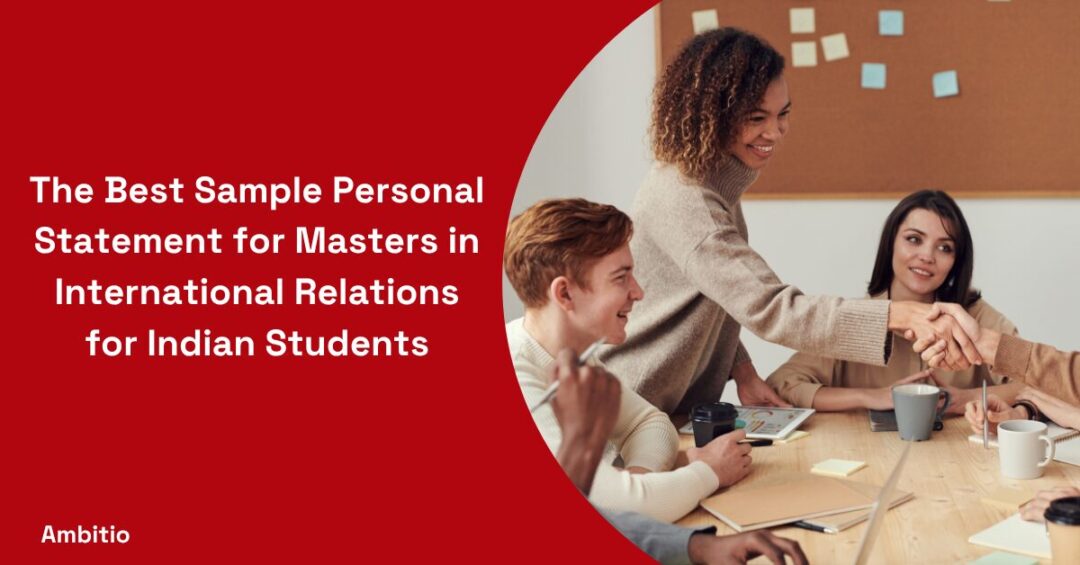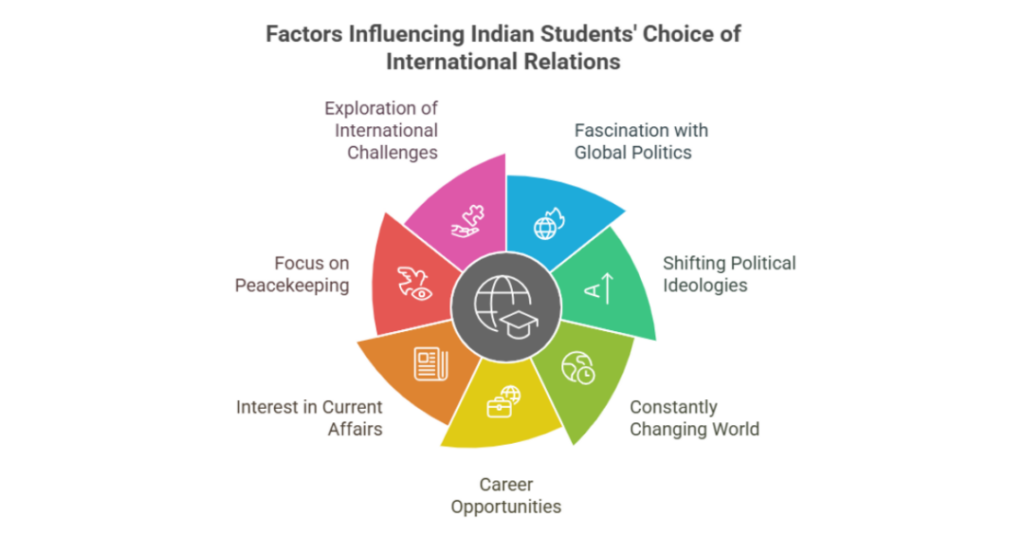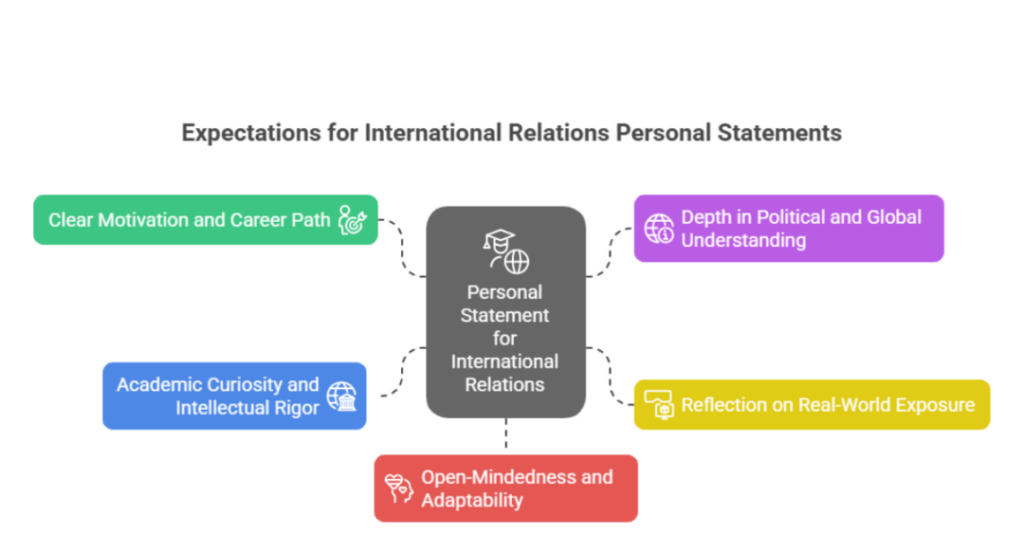29 May 2025
6 minutes read
The Best Sample Personal Statement for Masters in International Relations for Indian Students

Key Takeaways
- Personal statement for masters in international relations must reflect purpose, not clichés, only 7% of Indian applicants get long-listed.
- Top universities look for clarity, real-world exposure, and global political awareness beyond academic scores.
- Ambitio helps Indian students craft winning profiles with expert SOP writing and personalized guidance.
Only 7% of Indian applicants to the finest International Relations programmes in the world manage to get long-listed, not because they don’t have potential, but because their personal statement for Masters in International Relations screams roboticism.
Most of them merely reiterate phrases like: “I have always been fascinated by politics and international relations” without adding anything of substance. In a world filled with fragile relations, geopolitical fluidities, and globalisation, you need a real voice. This blog provides a personal statement example that speaks to today’s changing world – human, penetrative, and designed for impact.
Why Indian Students Choose International Relations for Their Master’s Degree?
Indian students increasingly choose to study international relations due to a deep fascination with global politics, shifting political ideologies, and the constantly changing world. The field of international relations offers a solid foundation for a career within international affairs, diplomacy, or NGOs.

With growing interest in current affairs, peacekeeping, and the causes and effects of current and future human interactions, many write a personal statement for masters in international relations to explore public affairs, conflicts, and social and political challenges on an international scale.
What do top universities expect in a personal statement for international relations?
Top universities don’t want a generic story, they want a sharp, reflective, and globally aware personal statement for masters in international relations. They’re assessing more than your grades.

They want to know how well you understand the world of politics, where your values lie, and how you’ll contribute to the evolving global political landscape. Here’s what they expect:
1. Clear Motivation and Career Path
Universities look for students who have developed a strong interest in the field, not overnight, but over time. Whether you aim to become a diplomat, work with NATO, or impact developing nations, your personal statement must explain why this field became a fascination and how it aligns with your long-term career goals.
2. Depth in Political and Global Understanding
They expect insight into the study of international relations, including key topics like international politics, political issues, or conflicts involving the Islamic State or referendum debates. Referencing international studies, global political affairs, or how you see these events affect international relations shows your intellectual maturity.
3. Reflection on Work, Volunteer, or Real-World Exposure
Whether it’s volunteer work with NGOs, a work experience with a think tank, or involvement in public affairs, you must show you’re not just book-smart. The best personal statement sample demonstrates how real-world experiences helped develop transferable skills, compassion for humanity, or understanding of organisation-level challenges.
4. Academic Curiosity and Intellectual Rigor
Your statement of purpose should reflect not only your past achievements but also your curiosity for exploring the causes and effects of current and future human interactions. Show that you’re fascinated by the constantly changing political climate, and interested in the study of conflicts or the nuanced different interpretations in global debates.
5. Open-Mindedness and Adaptability
Top universities want international students who are open-minded, aware that the world of politics is messy, full of challenges and opportunities. Show that you respect political ideologies, embrace self-development, and understand your home country in the context of broader international dynamics.
Section by Section Breakdown of the Best Sample Personal Statement
Here’s a section-by-section breakdown of what the best personal statement for masters in international relations should include, especially for Indian and other international students applying to top postgraduate programs.
1. Introduction: Hook and Purpose
Start your personal statement for masters in international relations with a compelling hook. Mention a specific political event, policy shift, or global issue that made you want to study politics or explore how global organisations influence the world. Show you’re not just chasing a degree—you’re pursuing purpose.
2. Academic Background
Discuss your undergraduate performance, relevant coursework, and how your GPA reflects your readiness for an MSc or postgraduate degree. Mention how you’ve built knowledge and understanding in subjects like political theory, economics, or global history, especially if you aim for schools like Harvard University or London School of Economics and Political Science.
3. Test Scores and Academic Competency
Briefly include your IELTS, TOEFL, GRE, or GMAT scores to demonstrate your academic preparedness. Top universities such as Stanford University, Princeton University, and Yale University expect applicants who not only meet score thresholds but also convey intellectual readiness through strong writing and analysis.
4. Career Goals and Motivation
Describe how your experiences or ideas align with your future goals—whether it’s diplomacy, policy work, or leadership in international NGOs. This is where you define what kind of impact you want to make post-postgraduate study and how your career aspirations justify your choice of this field.
5. Scholarships and Financial Need (Optional)
If applicable, briefly mention your interest in scholarships for international students. Universities appreciate honest reflection on how financial aid can help you access education, especially if your past performance and ambition show clear promise.
International Relations Personal Statement Examples
In a world shaped by shifting alliances, fragile diplomacy, and complex global challenges, writing a compelling personal statement for masters in international relations isn’t just about showing interest, it’s about proving purpose.
Top universities look beyond credentials; they look for clarity of thought, motivation, and global awareness. Below is an original sample that demonstrates how to blend personal conviction with academic ambition.
Sample Personal Statement for Masters in International Relations
The day my hometown made national headlines during a regional border dispute, I realized the true weight of political decision-making. As I stood among communities divided by language, maps, and misunderstanding, I found myself questioning not just the conflict, but the systems that allowed it to unfold. This moment sparked my resolve to understand the principles of diplomacy and the power of international dialogue.
In my undergraduate studies, I pursued political science with a consistent focus on global governance. I led student forums on foreign policy, participated in a Model UN conference in New Delhi, and completed my thesis on how water-sharing treaties influence cross-border relations. Each academic experience deepened my interest and built the analytical foundation I now wish to elevate through postgraduate study.
My long-term goal is to become a diplomat focused on conflict resolution and humanitarian policy. I believe that through structured education, I can gain the theoretical frameworks and practical tools needed to contribute meaningfully on the global stage. A master’s degree will not just help me understand international systems, but shape how I work within them to create real-world impact.
What drives me is not just curiosity, it’s urgency. The modern world is not only interconnected; it is interdependent. The way nations respond to crises today defines the future of peace tomorrow. I want to be part of that response—not as a bystander, but as a policymaker who understands both the complexities and the human cost of inaction.
Insights: How to Improve and Personalize Your Own
- Start with a Real Story or Turning Point
Don’t just say “I’m interested in IR”, show where it began. Choose a personal experience or moment that shaped your worldview. - Focus on Academic and Practical Balance
Talk about both what you studied and how you applied it, through debates, conferences, or independent research. - Clarify Your Goals
Vague ambitions like “I want to help the world” won’t cut it. Be specific, what issues do you want to work on, and what roles interest you? - Use Purpose-Driven Language
Every line should answer: “Why does this matter?” Make sure your narrative feels necessary, not just nice.
Conclusion
Crafting a strong personal statement for masters in international relations is not just about storytelling. It’s about strategy, especially for Indian students navigating global admissions. Your voice needs to reflect depth, clarity, and purpose.
And that’s exactly where Ambitio steps in. At Ambitio, we don’t just edit—we elevate. From personalized profile building to expert-guided SOP writing, we help you turn potential into admission offers.
Ready to write a statement that opens global doors? Let Ambitio be your backstage crew while you take the spotlight. Join Ambitio Elite and build your dream admit profile today!
FAQs
What is a personal statement for masters in international relations?
A personal statement for masters in international relations is a written document where you explain your motivation, experiences, and suitability for the program.
How long should my personal statement for masters in international relations be?
Typically, a personal statement for masters in international relations should be 1-2 pages, unless the university specifies otherwise.
What should I include in my personal statement for masters in international relations?
Include your academic background, relevant experiences, interest in international relations, and career goals in your personal statement for masters in international relations.
How can I make my personal statement for masters in international relations stand out?
Use specific examples, demonstrate your passion for international relations, and show how the program aligns with your ambitions.
Should I mention specific faculty or research interests in my personal statement for masters in international relations?
Yes, referencing faculty or research areas shows you have researched the program and understand how it fits your interests.
Is it important to discuss current global issues in my personal statement for masters in international relations?
Yes, discussing current global issues can highlight your awareness and engagement with the field of international relations.
Can I use the same personal statement for masters in international relations for multiple applications?
You should tailor your personal statement for masters in international relations to each program to address their specific strengths and requirements.

You can study at top universities worldwide!
Get expert tips and tricks to get into top universities with a free expert session.
Book Your Free 30-Minute Session Now! Book a call now




























